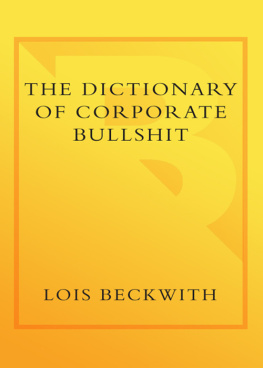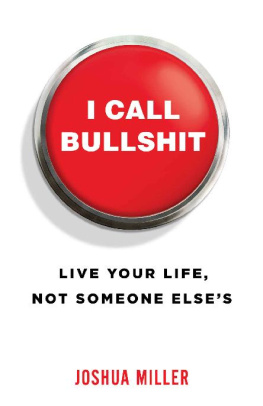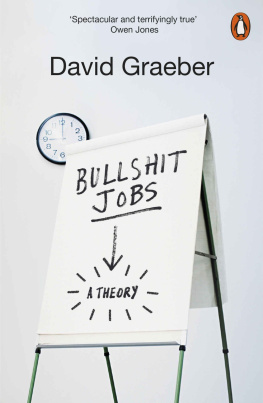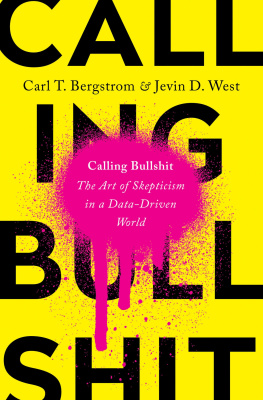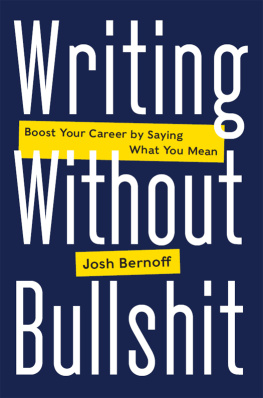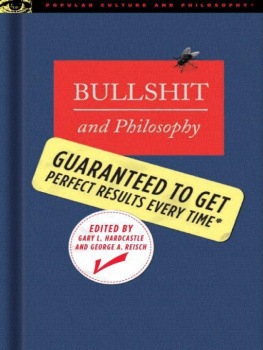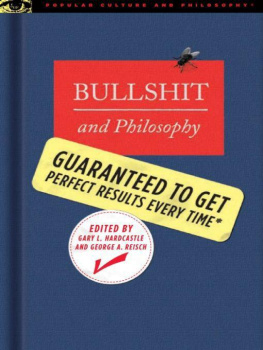Contents
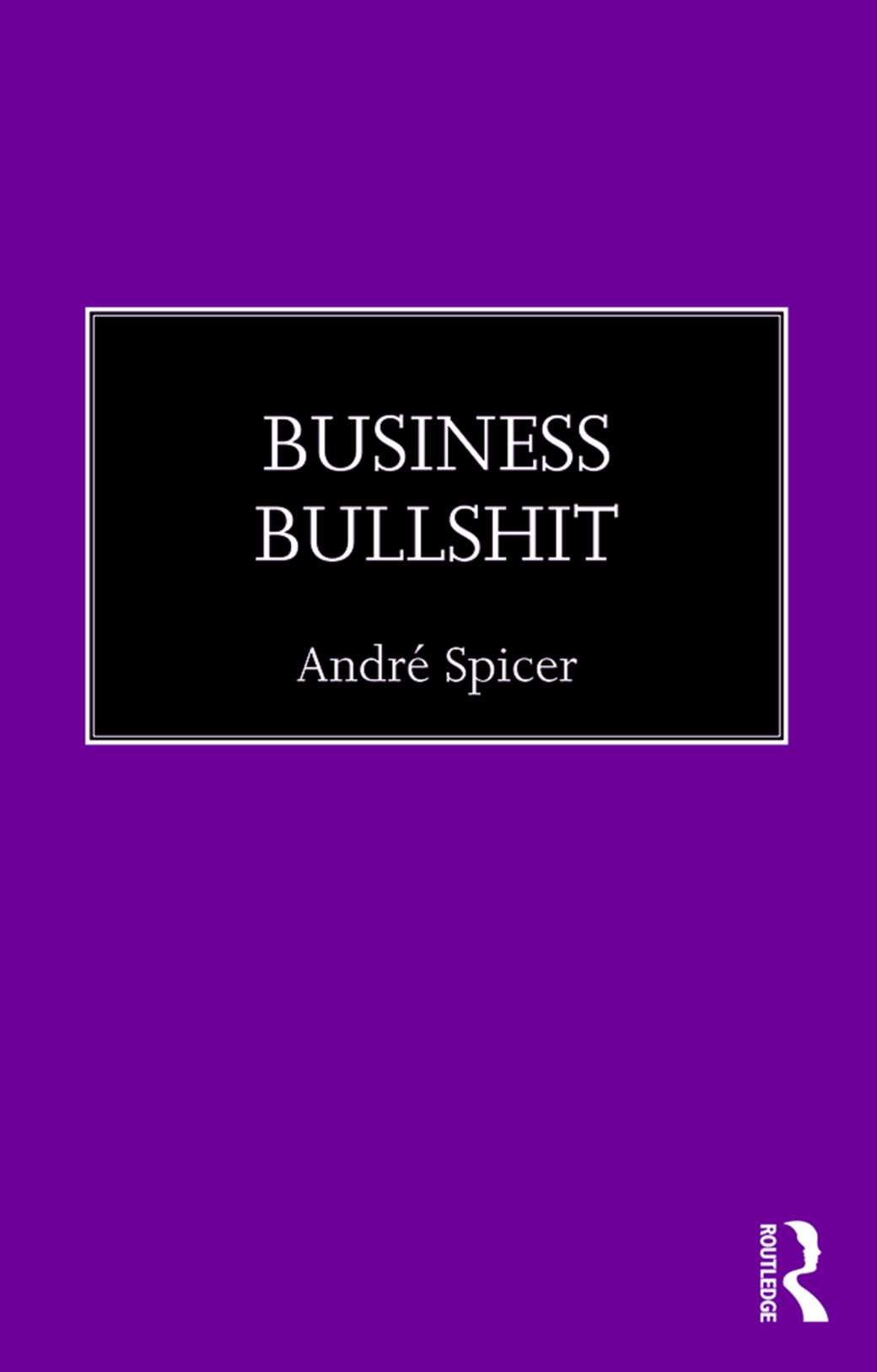
We hear business bullshit all day. But few know how it started, where it comes from or what to do about it. Andr Spicer is funny and clever on the topic and we badly need his practical wisdom to win through.
Margaret Heffernan, business woman and author of Wilful Blindness
Anybody familiar with corporate life will find this book extremely amusinguntil realizing that it is dead serious. The battle against bullshit is one worth fighting, even if you lose it. Read Spicers book, and engage.
Professor Martin Gargiulo, INSEAD
We live in an age of rising panic surrounding the status of truth in our politics and society. In this brilliant polemic, Andr Spicer demonstrates that our economy has long tolerated empty sloganeering and meaningless jargon, making a small minority of gurus and consultants very rich, but leaving the vast majority of us with a sense of deep pointlessness.
William Davies, Reader in Political Economy, Goldsmiths
Thorough and entertaining: Spicers mirror for managers. Spicer is one of these rare business academics who really understands business but also manages to maintain a healthy distance. This enables him to hold up a mirror to managers as few people can. In an insightful and entertaining way, he exposes nonsense in the world of businessof which there is plenty. However, what I liked best about the book is that he doesnt stop there: he also carefully explains why it persists in companies. This is important, because it enables managers who grasp his analysis to cut out the costly bullshit from their firms, improve their organisations in the process, and create a competitive advantage.
Freek Vermeulen, Associate Professor of Strategy and Entrepreneurship, London Business School
Business Bullshit
Our organisations are flooded with empty talk. We are constantly going forward to lands of deliverables, stopping off on the journey to drill down into best practice. Being an expert at using management speak has become more important than delivering long-lasting results. The upshot is that meaningless corporate jargon is killing our organisations.
In this book, Andr Spicer argues we need to call this empty talk what it is: bullshit. The book looks at how organisations have become vast machines for manufacturing, distributing and consuming bullshit. It follows how the meaningless language of management has spread through schools, NGOs, politics and the media.
Business Bullshit shows you how to spot business bullshit, considers why it is so popular, and outlines the impact it has on organisations and the people who work in them. It also describes what we can do to minimise bullshit at work. The author makes a case for why organisations need to avoid empty talk and reconnect with core activities.
Andr Spicer is a Professor of Organisational Behaviour at Cass Business School, City University of London. He has spent two decades studying the impact of management speak on organisations and the people who work there. He has advised a wide range of organisations and frequently appears in the global media to discuss business issues. Professor Spicer has published several books, including Contesting the Corporation, Metaphors We Lead By, The Wellness Syndrome and The Stupidity Paradox.
Business Bullshit
Andr Spicer

First published 2018
by Routledge
2 Park Square, Milton Park, Abingdon, Oxon OX14 4RN and by Routledge
711 Third Avenue, New York, NY 10017
Routledge is an imprint of the Taylor & Francis Group, an informa business
2018 Andr Spicer
The right of Andr Spicer to be identified as author of this work has been asserted by him in accordance with sections 77 and 78 of the Copyright, Designs and Patents Act 1988.
All rights reserved. No part of this book may be reprinted or reproduced or utilised in any form or by any electronic, mechanical, or other means, now known or hereafter invented, including photocopying and recording, or in any information storage or retrieval system, without permission in writing from the publishers.
Trademark notice: Product or corporate names may be trademarks or registered trademarks, and are used only for identification and explanation without intent to infringe.
British Library Cataloguing-in-Publication Data
A catalogue record for this book is available from the British Library
Library of Congress Cataloging-in-Publication Data
A catalog record for this book has been requested.
ISBN: 978-1-138-91166-6 (hbk)
ISBN: 978-1-138-91167-3 (pbk)
ISBN: 978-1-315-69249-4 (ebk)
Typeset in Bembo
by codeMantra
Truth is like poetry. And most people fucking hate poetry.
Overheard in a Washington, DC bar and reported in The Big Short
In the elevator, the latest news flashed past on one screen. On another screen, images of children in Africa were spliced with Yorkshire business men and share prices. My ears popped. The lift slowed, we got out. A well-dressed administrator clutching a mobile phone guided us to a meeting room. Two casually dressed executives shook our hands. Had I met them before? It didnt really matter.
After those scandals last year, what has your firm been doing to change the culture, I asked. The first executive looked delighted. He hit us with a blizzard of buzz words. It lasted for twenty minutes. Then, his colleague took over. She was even more excited. Twenty more minutes, then, we were given warm handshakes and escorted back through security. As we walked out of the building, I turn to my colleague. Wow, that was impressive!, I said. Those people really know their stuff.
Later that week, I listened to a recording of our interview. I was shocked. Instead of logical analysis, I heard a random collection of empty phrases. I was struggling to understand exactly what these people were talking about.
In the hope of escaping my own stupidity, I idly scanned the bookshelf in my office. Soon my eyes fell upon a small paperback. The title: Bonjour Laziness: Why Hard Work Doesnt Pay. It was by a French ex-corporate executive named Corinne Maier. Seemed to be an easy read, so I took it down.
Flicked through this little book, I soon found a section about business speak. According to Maier, this is a no-mans language, which is deliberately opaque and unintelligible. Only then did I realise my inability to understand these executives was not due to my own failure to get it. Actually, what I heard during that meeting was a perfect example of the empty language used by business people who speak so much and say so little.
I started to realise that so much of organisational life is made up of this empty talk. I have been studying what people say at work for two decades. I have always been on the look-out for meaning. Only then did it occur to me that much of the language used in corporations is completely meaningless. Whats more, it is meaningless by design.
This insight led me to explore the meaningless language of management. When I started looking, I found it everywhere: in schools, in banks, in consultancy firms, in politics, in the media. It seemed like a strange word virus had taken over our language.
My file of meaningless statements grew. But I still wasnt sure what to call it. Was it jargon, management fashions, discourse, rhetoric or something else? It took me a while to realise the best label for all this was bullshit.






